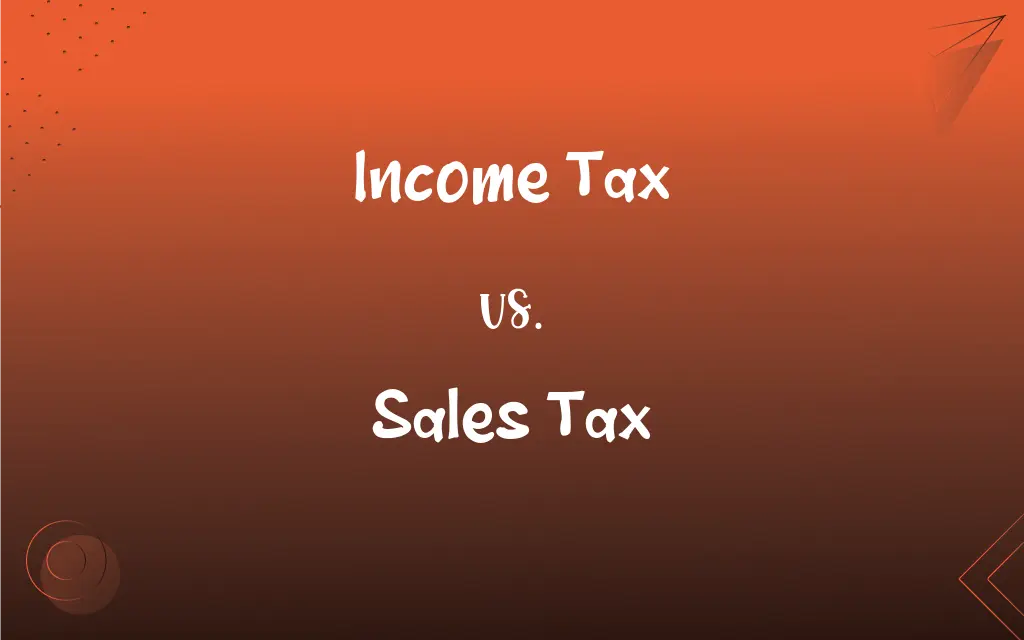Income Tax vs. Sales Tax: What's the Difference?
Edited by Aimie Carlson || By Harlon Moss || Updated on October 13, 2023
Income tax is levied on earned income; sales tax is charged on purchased goods/services.

Key Differences
Income tax is a direct tax imposed by governments on the financial income of individuals or corporations. Sales tax, on the other hand, is an indirect tax that consumers pay when purchasing goods and services.
Income tax rates are typically progressive, meaning they increase as one's income increases. Sales tax, conversely, is typically a flat rate applied to the sale price of a good or service, regardless of the buyer's income.
Income tax is usually deducted from one's paycheck and requires the filing of tax returns annually to reconcile any differences between amounts paid and owed. Sales tax is collected at the point of sale and is remitted by the retailer to the state or local government.
To determine one's income tax liability, individuals and corporations might need to consider various deductions, credits, and other adjustments. Sales tax doesn't offer such intricacies; instead, it's a straightforward percentage added to the transaction's total cost.
While income tax revenue supports federal, state, or local budgets for general or specific purposes, sales tax revenue generally supports state or local budgets and might be designated for specific uses, like infrastructure.
ADVERTISEMENT
Comparison Chart
Nature
Direct tax
Indirect tax
Applied On
Earned income
Purchased goods/services
Rate Structure
Typically progressive
Typically flat rate
Collection
Deducted from paycheck; annual return filing needed
Collected at point of sale; remitted by retailers
Adjustments
Deductions, credits available
Typically none
ADVERTISEMENT
Income Tax and Sales Tax Definitions
Income Tax
A government's tool to generate revenue from entities based on their income.
Countries use income tax to fund various public services.
Sales Tax
An indirect tax on goods and services at the point of sale.
The total price at checkout included the item's cost plus sales tax.
Income Tax
A tax rate applied to taxable income after deductions.
After claiming several deductions, Paul calculated his owed income tax.
Sales Tax
A percentage added to a product's price paid by the consumer.
Tourists were surprised by the high sales tax rate in the city.
Income Tax
Periodic charge (usually annually) based on income brackets.
With a higher salary, Olivia moved into a new income tax bracket.
Sales Tax
A levy based on the purchase price of a product.
Before making a big purchase, Roger always checks the sales tax rate.
Income Tax
A direct levy on an individual's or corporation's financial earnings.
When Jane received her paycheck, she noticed the amount deducted for income tax.
Sales Tax
Charge imposed on retail items or services at purchase.
Businesses are responsible for remitting collected sales tax to the government.
Income Tax
A fiscal obligation based on earnings.
New businesses often seek advice on income tax responsibilities.
Sales Tax
A revenue source for state or local governments on transactions.
Some states have no sales tax, attracting more shoppers.
FAQs
At what point is sales tax applied?
Sales tax is applied at the point of sale when purchasing goods or services.
What is income tax?
Income tax is a direct tax levied on individuals' or corporations' financial income.
Do all states have sales tax?
No, some states in the U.S. do not impose a sales tax.
Is income tax rate the same for everyone?
No, income tax rates are typically progressive, increasing with one's income.
Are there exemptions from sales tax?
Yes, certain items or groups (like nonprofits) may be exempt from sales tax in some jurisdictions.
How is sales tax different from income tax?
Sales tax is an indirect tax on purchased goods/services, while income tax is on earned income.
How often do retailers remit sales tax?
Retailers usually remit sales tax to the government monthly, quarterly, or annually, depending on local regulations.
How do online businesses handle sales tax?
They collect sales tax based on the buyer's location if required by local laws.
How is income tax enforced?
Governments require annual tax return filings to ensure the correct income tax is paid.
What happens if I don't pay income tax?
Not paying income tax can result in penalties, interest charges, and legal actions.
How do businesses keep track of sales tax?
Businesses use accounting software or systems to accurately collect and remit sales tax.
Can deductions affect income tax?
Yes, certain deductions can reduce the taxable income, affecting the income tax amount.
What's the purpose of collecting income tax?
Income tax revenues support federal, state, or local budgets for various public services.
Do foreigners pay income tax?
Foreigners earning income in the U.S. may be subject to U.S. income tax, depending on various factors.
Can I get a refund on overpaid income tax?
Yes, if you overpay your income tax, you can receive a refund after filing your tax return.
Are retirement funds subject to income tax?
Typically, withdrawals from taxable retirement accounts are subject to income tax.
Who typically pays income tax?
Both individuals and corporations pay income tax based on their earnings.
Are food items subject to sales tax?
It varies by state; some states do not tax essential food items, while others do.
Are services always subjected to sales tax?
It depends on the state; some states tax services, while others do not.
Does sales tax apply to digital goods?
Some states impose sales tax on digital goods, while others do not.
About Author
Written by
Harlon MossHarlon is a seasoned quality moderator and accomplished content writer for Difference Wiki. An alumnus of the prestigious University of California, he earned his degree in Computer Science. Leveraging his academic background, Harlon brings a meticulous and informed perspective to his work, ensuring content accuracy and excellence.
Edited by
Aimie CarlsonAimie Carlson, holding a master's degree in English literature, is a fervent English language enthusiast. She lends her writing talents to Difference Wiki, a prominent website that specializes in comparisons, offering readers insightful analyses that both captivate and inform.































































